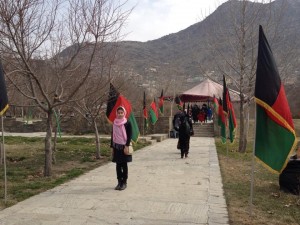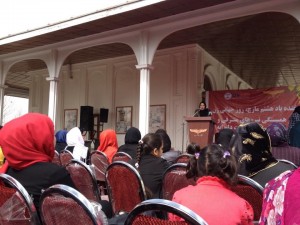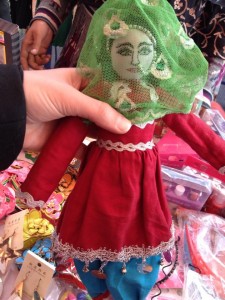Editors note: On the 8th March 2013, people around the world celebrated international women’s day. Pax Populi did this by honouring the women of Afghanistan and raising awareness about their struggle for rights through the “Be Inspired†initiative, a webpage sharing with the world the triumphs, challenges and future visions of Afghan women, and in the following piece, the author, Maryam Safi, recounts how women in Afghanistan celebrated that day and how in doing so, they demonstrated their own empowerment and the greatness of their Afghan culture and traditions.
Maryam Safi is an Afghan national born in Kabul in 1986.  Due to the civil war her family emigrated to Pakistan and Iran. She received her primary and secondary education outside of Afghanistan, but returned to Kabul where she graduated, from a girl’s high school.
Following high school she went on to study for her Bachelors in Islamic Law, at Kabul University and is now currently studying for her Masters Degree in “Social Change and Peace Building†at Future Generations Graduate School and the US Institute of Peace.
Maryam, decided to study for a Masters in Social Change and Peace Building because as she tells us, “My country, Afghanistan, experienced many years of war and it needs peace.  My goal is to work for my country and for my people’s empowerment to lead the country toward peace. I especially want to focus on women and children issues because these two categories have been the most vulnerable and deprived through the years. Women have been deprived from participating in many aspects of the life of the country and it’s impossible to bring change and peace if they are so excluded. As for children, they are the future of the country.â€
Celebrating International Women Day in Bag-e-Babar-Kabul
Over the past 10 years women in Afghanistan have made significant achievements and are actively participating in many aspects of the social, political, cultural and economic life of Afghanistan. This year on 8th March, women actively participated in the celebration of International Women’s Day in Bag-e-Babar, Kabul, which was facilitated by the Mayor.
It was a day to honor the achievements of women. The day’s programme was organised very well and Afghan women presented their own achievements and those made by other Muslim women in the history of Islam.
A great sense of Afghan national pride was created with the area being decorated with the Afghan flag, which made every Afghan attending proud of our country. Those women and young girls seemed to be very happy to participate in this celebration programme. Female police officers also provided security and worked hard to control the security of venue.
One of the first things brought to my attention during the day was an exhibition center inside the venue’s garden. Within the exhibition Afghan women gathered from different parts of the country and brought their handicrafts to sell. The clothes they presented were all made by hand; jewellery made of colourful marbles and handmade dolls in Afghan style traditional clothing. It was amazing to see all these creative works and it really highlighted the artistry and talent of Afghan women.
The culture of a country is its biggest asset and the historical inheritance for its people, and this day’s exhibition allowed Afghan women from both urban and rural areas to show how rich in culture Afghanistan truly is. The craftwork illustrated the artistry and talent of Afghan women, within their country’s culture and traditions.
By traveling long distances to sell their handicrafts goods, demonstrating the courage and talent of Afghan women. The talent of Afghan women could be clearly recognized in these handicrafts. It was also clear to see that despite the many problems and restrictions these women face on a daily basis, their achievements are remarkable.
Many people have focused attention on the accomplishments made by educated women in Afghanistan over the past ten years, and while that cannot be ignored, the skills demonstrated by these women are a powerful testimony to the fact that even uneducated women living in rural areas without access to education also have made great strides in preserving and advancing Afghan culture through their work. Such women further illustrate female empowerment in Afghanistan because each of these women assume economic responsibilities for their families.



0 Comments